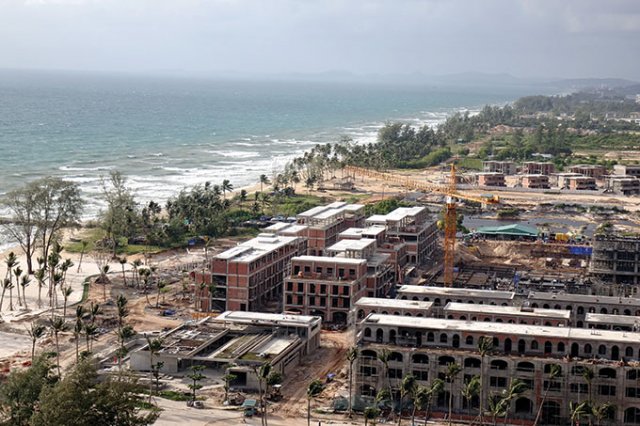
(Photo: Viet Tuan)
Vietnam’s real estate race is becoming hotter than ever with the growing attention of many domestic and foreign investors and a record amount of investment in recent years.
JLL has observed that hundreds of millions of dollars in FDI are ready to be poured into Vietnam’s real estate market. The tourism industry, meanwhile, saw a record 15.5 million international visitors and 80 million domestic tourists in 2018, and aims to welcome 20 million foreign visitors by 2020. The Comprehensive and Progressive Agreement for Trans-Pacific Partnership (CPTPP) and the EU-Vietnam Free Trade Agreement (FTA) together with other FTAs will help balance any negative effects that may arise from the US-China trade war.
Vietnam is also focusing on investment in infrastructure, including 2,000 km of new highways, metro lines in Hanoi and Ho Chi Minh City, and many airport expansion and construction projects.
It is therefore not surprising that investors and real estate developers are ready to commit to this high-growth market. The following are the main trends that will shape Vietnam’s real estate market in the following years.
Mid-end and affordable segment to dominate
According to JLL, the total supply of completed apartments in Ho Chi Minh City reached 160,000 units in all segments, corresponding to a rate of 17 apartments per 1,000 people. “When this rate is high, we should invest in high-end apartments, but when it is low we should focus on the mass housing market, where there is real demand for apartments,” said Mr. Stephen Wyatt, General Director of JLL Vietnam.
At the same time, there is an increase in small and ultra-small apartments. About ten years ago, high-rise apartment projects had two-bedroom apartments of about 120 sq m, but now there are no two-room apartments over 100 sq m. The desired apartment size for both buyers and developers has changed. “Most first-time homebuyers are only able to afford larger apartments in apartment blocks far from the city center,” said Mr. Wyatt. “But psychologically, young buyers want to live in a convenient place, so they still want to buy small apartments with full amenities and community connections.”
Flexible workspaces
Flexible workspaces are becoming more and more popular in Vietnam, largely due to limited supply of traditional office space in sought-after locations. The country currently has 25 high-end flexible space operators, with prominent names including Toong, Dreamplex, Circo, Workyos, Kloud, CEO Suites, UP, and WeWork.
Vietnam’s flexible workspace market is still in its infancy, though the first serviced office provider, Regus, has been operating since 1999. Flexible space offers economy to companies due to reduced costs from sharing space and facilities.
In the beginning, demand mainly came from startups who wanted to rent short-term office space as well as businesses seeking temporary office locations. Co-working units are currently focusing on identifying and approaching business tenants who need to move while renovating their offices to come to co-working spaces through temporary services called tailoring offices. For this type of service, operating units search for premises and design and manage flexible workspaces according to each customer’s specific requirements.
Tech companies to drive office occupancy
With the strong growth of e-commerce in Vietnam, JLL predicts that tech companies will continue to hunt for ideal office buildings and quickly become the main tenant group, and this is an opportunity for investors who can build offices in time to keep up with demand.
According to observations by JLL, the prerequisites for tech companies is that the office location allows it to attract talent, is supported by the government, and has convenient traffic, with live-work-play facilities integrated into the surrounding environment.
Tech companies are constantly looking for high-quality office space to attract talent, so investors in Vietnam need to consider such needs.
Logistics growing for e-commerce
In Vietnam, along with the continuous growth of smartphones and 4G network coverage, revenue from online shopping continues to increase.
Logistics is an indispensable part of the successful development of the e-commerce market. Many foreign logistics and e-commerce service providers are working hard to not miss the opportunity to penetrate into Vietnam. The birth of the BW Industry Development JSC, a joint venture between the Warburg Pincus Global Investment Fund and Becamex IDC in January 2018, can be taken as a sign of the great potential in this market.
Compared to other countries in the region, Vietnam’s logistics market is still in its infancy, mainly providing low-tech products developed in remote areas. With the development potential of the e-commerce industry and the manufacturing sector, Vietnam’s logistics market is expected to take a new step in its development process, similar to the process that other markets in the area have gone through.
Hotel lifestyle
Millennials like to live in different types of space compared to the generation of their parents and grandparents. This is a generation that has grown up with technology, social media, and a globalized economy. They are highly adaptable and always willing to share facilities with each other. So, it is not surprising that hotel lifestyle - a modern hotel model with increasing exposure to nature - is increasing.
With the shortage of hotel supply in famous tourist destinations such as Ho Chi Minh City, Hanoi, Da Nang, Nha Trang, and Phu Quoc Island, the hotel lifestyle market is receiving considerable attention from investors, especially homeowners, who seek nature-friendly properties with beautiful views.
Another factor that needs to be considered is sustainability and timeliness. Hotel lifestyle projects with modern design and decoration will attract many tourists. These accommodation spaces also need to maintain consistent performance through regular maintenance, security enhancement, and the provision of regional specialties for tourists.
Overall, 2018 was a positive year for the real estate market, and we expect this performance to continue in 2019 in all segments.


















